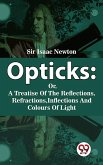In "Opticks," first published in 1704, Isaac Newton presents a groundbreaking exploration of light and color through meticulous experimentation and keen observation. This work is written in a rigorous yet accessible style, intertwining philosophical musings with empirical findings. Newton's prose unfolds the phenomena of refraction, reflection, and the composition of light, showcasing his innovative use of the scientific method at a time when natural philosophy was transitioning into modern science. The book not only lays the foundation for the field of optics but also provokes profound questions about perception and the nature of reality, signaling a shift in the way light was understood within the broader context of Enlightenment thought. Isaac Newton, renowned as one of the pivotal figures in the history of science, was driven by his fascination with the laws of nature, which he sought to elucidate through rigorous inquiry. His work in mathematics, physics, and astronomy reflects a deep commitment to understanding the universe. "Opticks" emerged during his later years, demonstrating his unwavering quest to decode the mysteries surrounding visible light, likely influenced by the contemporary scientific dialogue of his time and his own experiences with prismatics. This seminal text is essential for anyone keen to understand the evolution of scientific thought regarding optics and perception. Readers will find themselves immersed in the meticulous observations that shaped modern physics, as well as the philosophical implications therein. "Opticks" remains a vital work, not only for scholars and scientists but for anyone captivated by the interplay between light and the world around us.
Dieser Download kann aus rechtlichen Gründen nur mit Rechnungsadresse in A, B, BG, CY, CZ, D, DK, EW, E, FIN, F, GR, H, IRL, I, LT, L, LR, M, NL, PL, P, R, S, SLO, SK ausgeliefert werden.









